七年级英语上期末复习提纲
七年级上册期末英语复习提纲.doc

七年级上册期末英语复习提纲注意:物主代词的使用方法:后有名词时用形容词性的,后无名词时用名词性的,即:有名则形,无名则名。
18、who 谁; whose 谁的,是who 的所有格。
如:Who’s that boy?那个男孩子是谁? Whose baby is that?那是谁的小孩呀? 19、 What do/does + 某人 + look like ? 询问人的长相例: What does your English teacher look like ? He is thin and tall.他又瘦又高。
20、 What’s…and…? …加…是什么?(回答:It’s …)例:What’s red and yellow?It’s orange.What’s two and five? It’s seven. 2 加5 等于几?等于7。
21、Jane’s and Maria’s:Jane的和 Maria 的(两人共有)Jane and Maria’s:Jane和 Maria 的(各自拥有) 22、Who is the letter from? It’s from my penpal, Sam. (不用where) 23、What color be + 东西? (回答:It’s +颜色或者 They’re + 颜色) 例:What color is your dress? It’s black. What color are your pants? They’re black.英文一般疑问句及肯定和否定回答一般疑问句是以be动词、情态动词和Do/Does开头的,用Yes或No回答的疑问句。
Ⅰ、以be动词开头的一般疑问句及答句③ Am I …? Yes,you are./No,you aren’t. ②Are you …? Yes,I am./No,I’m not. ③Is he/she/it…? Yes,he/she/it is.No,he/she/it isn’t.④Are we/you/they …? Yes,we/we/they are No,we/we/they aren’t. Ⅱ、以情态动词开头的一般疑问句及答句Can…… ? Yes,…can. No,…can’t(cannot). Ⅲ、以Do/Does开头的一般疑问句及答句①Do you +行为动词?Yes,I do/No, I don’t.②Do we/you/they+行为动词?Yes,we/they do. No, we/they don’t.③Does he/she/it+行为动词?Yes, he/she/it does. No, he/she/it doesn’t. 注意事项:1、肯定和否定回答中必须用人称代词主格,即只能用I,we,you,he,she,it,they等,不能出现其它词,特别注意不能用this,that,these,those等指示代词。
七年级上册期末英语复习提纲

七年级上册期末英语复习提纲【导语】以下是作者为您整理的七年级上册期末英语复习提纲,供大家学习参考。
Unit 1 1、Good morning/ afternoon / evening 早上/下午/晚上好Good night 晚安(晚上辞别) 2、Nice /Glad to meet you认识你很高兴(初次相识)(回答也一样) Nice /Glad to see you 见到你很高兴(熟人见面) 3、welcome to + 地点欢迎来到…… (回答:Thank you 或者Thanks) 4、Are you …? 你是…吗?回答:Yes,I am.(不用Yes,I’m.) 5、Hello!/Hi! 你好!6、 this is----- 这位是…… (用于介绍他人) 7、 How do you do ?你好(回答也是:How do you do ? ) 8、 How are you ?=How are you doing ? 你好吗? Fine ,thank you .and you ? 很好,谢谢,你呢?I’m OK / I’m fine , too . 我也很好。
9、see you = see you later = see you next time= good-bye =Bye.再见/下次见 10、 excuse me打扰一下;请问(要打扰他人前的礼貌用语;Sorry是道谦用语)11、I’m -----= my name is ----我是/我叫……12、be(am,is,are) from = come from 来自13、 in English/Chinese 用英语/汉语 14、Can you spell it ?你能拼写它吗?Yes,I can / No,I can’t 是的,我能/不,我不能 15、That’s OK = That’s all right= You’re welcome = Not at all不用谢 16、…years old …岁how old 多大,几岁 17、 telephone number 电话号码; QQ number QQ号码; ID number 身份证 18、 the same (相同的,后常跟单数名词)反义词: different 不同的,后常跟复数名词)例: Weare in the same grade, but we are in different classes.19.What is your telephone number? 你的电话号码是多少?(注意:疑问词用what,而不能用how many/how much)(回答:My telephone number is----或者It’s -------) 20. what class are you in ?你是在几班? I am in Class Five. (注意:Class 和 Five要大写)What grade are you in ? 你是在几年级?I am in Grade Seven. 21. What’s this/ that (in English) ?这是什么?(回答:It’s a/an + 单数名词. 这是……)What’re these/ those (in English) ? 这些是什么?(回答:They’re + 复数名词. 这些是……) 22. How do you spell it?你怎么拼写它? E-R-A-S-E-R, eraser. Unit 2 1、描写长相:某人+ has/ have +( an /a ) +形容词+五官 = 某人的五官 is / are + 形容词例:Lily has a small nose. = Lily’s nose is small. I have big nose.=My nose is big 2、I know = I see 我明白了 3、That’s right=You're right那是对的,你说的对。
人教新目标 七年级上册英语期末复习提纲

人教新目标七年级上册英语期末复习提纲人教新目标-七年级上册英语期末复习提纲(一)每个单元的知识点unit1myname’sgina.一、短语1.goodmorning/afternoon/evening/night2.first/last/familyname3.telephone/phonen umber4.idcard/schoolidcard5.pencilcase/sharpener二、句型/语法点1.howareyou?2.nicetomeetyou!3.什么是西班牙语?=英语有什么价值?4.你怎么拼写?5.请拼一下。
6.什么颜色?7.what’syour(his/her)name?=mayiknowyourname?8.what’syourphone/telephonenumbe r?unit2isthisyourpencil?一、短语一1.isthis/thatyourpencil?unit3thisismysister.一、短语感谢(某事/做某事)。
笔友/pal3。
家庭照片。
拍照2。
句型/语法要点1:你的朋友?2.这个/那个是物理学家。
这些/那些是我的兄弟。
第四单元背包在哪里?1、短语1.2。
录像带3.math/chinese/englishbook4.take/bringsthtosb5.needsth;needtodosth二、句型/语法点1.背包在哪里?2.一些和任何之间的区别3.运用in,on,under,behind等介词二1.tennis/badmintonracket2.ping-pong/baseballbat3.watchtv/watchsthontv4.playsports5.sportscollection6.soccerball二、句型/语法点1.你有手机吗?2.我们开始吧。
3.everyday与everyday的区别4.听起来不错/有趣/无聊……你喜欢吃香蕉吗?1、短语1法语2。
新人教版七年级英语上册期末复习计划(提纲)

七年级英语上册期末复习计划(提纲)第一:复习单词。
也就是背单词,教会学生按音标背单词,分层教学,一方面要计划适合优生、中等生和后进生要记的单词数量,数量上讲究循序渐进,由少到多。
要学会在句子中背单词。
另一方面,一定要高频次的复习:多说、多练、多背、多用。
第二:重点短语。
按字母顺序和考试常考的短语,归类记忆。
把短语放在句子中记忆,把句子放在对话中背诵,以确保长时间记忆!第三:常考句型。
把七年级上册常考的20个句型,归类记忆,少讲多练。
第四:以练代考。
学生普遍做题较少,导学方案的“你听我说”(听力)、单元自测、训练案、自主训练案,我手里题每天投影做一道题:单项选择、补全对话、完形填空、阅读理解(一天一篇)、词语运用和书面表达。
先限定时间让学生自己做,然后讲解,重点培养做题思路、解题方法和技巧。
网上找到前两年七年级第一学期阶段四质量评估英语试题和期末质量评估英语试题,小测验一下,查漏补缺。
第五:书面表达。
学生写作普遍需要提高,所以利用初中英语单元话题中考对接读写精炼中的话题写作,教会学生写作:思路图示、布局点拨、句型参考、范文借鉴、写作实践、难点突破、创作体验。
总之,从单词、短语、句型、阅读、写作和做题方法与技巧,让学生形成知识网络,能学、会学、爱学。
一、制订合理复习计划期末考试复习内容多、任务重、时间紧,要想在短时间里把整个学期的学习内容复习好,就要制订科学合理的计划,有的放矢,达到复习的“获得感”。
在制订计划时同学们必须注意:1.针对教材,合理安排复习时间,每天按时按量完成复习任务。
2.结合错题,找出自己的薄弱环节,每天复习的内容要有重点。
3.循序渐进,量力而行,每次复习内容不要贪多,俗话说“贪多嚼不烂”,也会因为任务过多导致疲惫放弃。
二、注重基础知识复习同学们要立足教材,复习时以课本上的知识点为主线进行系统的梳理,构架较为完整的“知识树”。
在复习过程中要以听,说,读,写为主要形式和抓手,全面排查学得不扎实的薄弱环节,从单词、词组、句型、句子到短文。
最新最全2023年七年级英语上册复习提纲(知识点总汇)
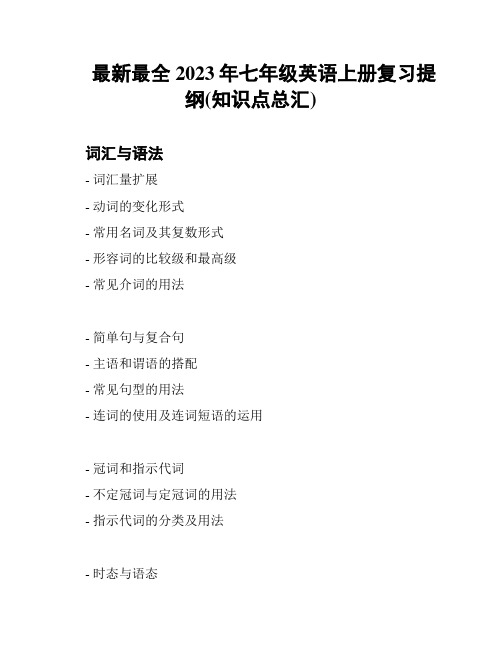
最新最全2023年七年级英语上册复习提
纲(知识点总汇)
词汇与语法
- 词汇量扩展
- 动词的变化形式
- 常用名词及其复数形式
- 形容词的比较级和最高级
- 常见介词的用法
- 简单句与复合句
- 主语和谓语的搭配
- 常见句型的用法
- 连词的使用及连词短语的运用
- 冠词和指示代词
- 不定冠词与定冠词的用法
- 指示代词的分类及用法
- 时态与语态
- 一般现在时与一般过去时- 进行时和完成时态
- 被动语态的构成和用法
听力与口语
- 日常生活用语
- 问候与道别
- 对时间和日期的表达
- 规划和描述活动
- 能力描述和要求
- 描述人物外貌和性格
- 询问他人的能力和要求- 表达自己的能力和要求
- 问答与对话练
- 基本问句的构成
- 口语对话中的常用表达- 听力训练和问题回答
- 场景对话与小组讨论
- 在不同场景中的自我介绍和交流- 小组讨论的技巧和表达方式
- 同伴互动和角色扮演
阅读与写作
- 文本理解技巧
- 阅读文章的标题和首尾句
- 掌握主旨和信息的提取技巧
- 根据文章推测答案
- 日常生活话题写作
- 描述自己的家庭和朋友
- 记述日常活动和研究情况
- 书写简单的邀请和告示
- 阅读文章写作
- 根据提示写一篇短文
- 回答问题并用完整的句子写作- 写作时注意语法和拼写问题
- 口头表达与写作训练
- 口头描述图片和照片
- 根据提示写一篇30词左右的短文
- 阐述自己的观点并提供理由
以上为2023年七年级英语上册复习的知识点总汇,希望能对学习有所帮助。
人教版七年级英语上册(部编2023) 期末复习提纲

人教版七年级英语上册(部编2023) 期末复习提纲Unit 1: Greetings and Introductions- Greeting people and responding- Introducing oneself and others- Asking and answering personal information questions- Making simple conversations using greetings and introductionsUnit 2: My Family- Describing family members and their characteristics- Talking about family relationships- Using possessive adjectives to describe family members- Sharing information about one's familyUnit 3: School Life- Talking about daily school routines- Describing classroom objects and places- Discussing subjects and school activities- Expressing likes and dislikes about school lifeUnit 4: Hobbies and Interests- Talking about hobbies and interests- Describing activities related to hobbies- Expressing preferences and opinions about hobbiesUnit 5: Food and Drinks- Describing food and drinks- Talking about likes and dislikes of food- Ordering food and drinks at a restaurant- Expressing preferences for different types of foodUnit 6: Colors and Clothes- Learning different colors in English- Describing clothes and their colors- Talking about clothing preferences and styles- Discussing appropriate clothing for different occasionsUnit 7: Numbers and Telling Time- Learning and pronouncing numbers in English- Talking about dates and birthdays- Telling time and discussing daily schedules- Expressing time using both analog and digital formatsUnit 8: Daily Activities- Discussing daily activities and routines- Talking about leisure activities and free time- Using time expressions to describe daily routinesUnit 9: Places in the City- Describing different places in a city- Giving directions to navigate through a city- Talking about likes and dislikes of places- Discussing activities to do in different locationsUnit 10: Occupations and Aspirations- Learning and pronouncing different occupations- Talking about future aspirations and dreams- Describing job responsibilities and characteristics- Discussing personal interests related to future careersUnit 11: Weather and Seasons- Describing different weather conditions- Talking about seasons and their characteristics- Discussing favorite seasons and weather preferences- Expressing feelings and emotions about the weatherUnit 12: Holidays and Celebrations- Learning about different holidays and celebrations- Describing traditions and customs of specific holidays - Talking about personal experiences during holidays- Expressing wishes and greetings for different occasionsUnit 13: Daily Routines- Talking about daily activities and schedules- Using adverbs of frequency to describe routines- Discussing preferences for different activities- Expressing opinions about daily routinesUnit 14: Health and Body- Describing body parts and their functions- Discussing healthy habits and lifestyle choices- Giving advice for maintaining good healthUnit 15: Shopping- Talking about different types of shops and stores- Describing items for sale and their prices- Discussing shopping preferences and habits- Asking for help and making purchases at a storeUnit 16: Transportation- Learning and pronouncing different modes of transportation - Talking about means of transportation and their features- Describing travel experiences and preferences- Asking for transportation information and directionsUnit 17: Countries and Nationalities- Learning and pronouncing different countries and nationalities - Talking about one's own and others' nationalities- Discussing cultural characteristics and traditionsUnit 18: Daily Life in Different Countries- Learning about daily life customs in different countries- Talking about cultural differences and similarities- Discussing traditional food, clothing, and activities- Sharing personal experiences or knowledge about other countries- Talking about different types of technology and devices- Describing how technology is used in daily life- Discussing advantages and disadvantages of technology- Expressing opinions about technology and social mediaUnit 20: Review and Assessment- Reviewing key vocabulary and grammar points from previous units- Practicing listening, speaking, reading, and writing skills请根据这个提纲来复习人教版七年级英语上册的内容。
七年级英语上册期末复习提纲

MODULE 1 Nice to meet you一、同义句1.My name's Daming. = I'm Daming.2.I'm from England. = I come from England.3.Are you a new student? ≈ Are you new?4.Nice to meet you. = Nice to see you. =Glad to meet you. = Glad to see you.二、特殊疑问句—What's your name?—How old are you?—My name is ....—I'm twelve years old.—Where are you from? —What class are you in?—I'm from... —I'm in Class One, Grade One.三、单词短语1.practise + doing sth. 练习做某事2.with&and Lingling and Daming go to the park.Lingling with Daming goes to the bank.e from相当于be from。
come是行为动词,否定句和疑问句要借助助动词do或does.3.the first English lesson 第一节英语课四、人称代词一览表主格宾格所有格(……的)我I me my我们we us our你、你们you you your他he him his她she her her它it it its他们they them their五、动词be(is,am,are)的用法我(I)用am, 你(you)用are,is跟着他(he),她(she),它(it)。
单数名词用is,复数名词全用are。
变否定,更容易,be后not加上去。
初一年级上册英语复习提纲【三篇】
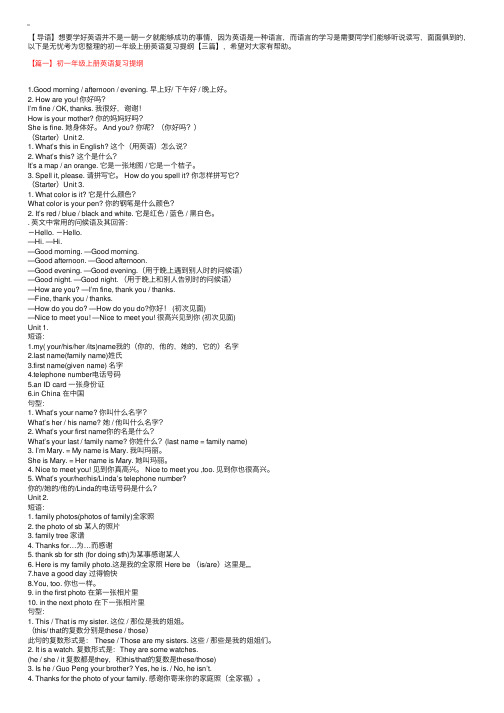
【导语】想要学好英语并不是⼀朝⼀⼣就能够成功的事情,因为英语是⼀种语⾔,⽽语⾔的学习是需要同学们能够听说读写,⾯⾯俱到的,以下是⽆忧考为您整理的初⼀年级上册英语复习提纲【三篇】,希望对⼤家有帮助。
【篇⼀】初⼀年级上册英语复习提纲1.Good morning / afternoon / evening. 早上好/ 下午好 / 晚上好。
2. How are you! 你好吗?I’m fine / OK, thanks. 我很好,谢谢!How is your mother? 你的妈妈好吗?She is fine. 她⾝体好。
And you? 你呢?(你好吗?)(Starter)Unit 2.1. What’s this in English? 这个(⽤英语)怎么说?2. What’s this? 这个是什么?It’s a map / an orange. 它是⼀张地图 / 它是⼀个桔⼦。
3. Spell it, please. 请拼写它。
How do you spell it? 你怎样拼写它?(Starter)Unit 3.1. What color is it? 它是什么颜⾊?What color is your pen? 你的钢笔是什么颜⾊?2. It’s red / blue / black and white. 它是红⾊ / 蓝⾊ / ⿊⽩⾊。
. 英⽂中常⽤的问候语及其回答:-Hello. -Hello.―Hi. ―Hi.―Good morning. ―Good morning.―Good afternoon. ―Good afternoon.―Good evening. ―Good evening.(⽤于晚上遇到别⼈时的问候语)―Good night. ―Good night. (⽤于晚上和别⼈告别时的问候语)―How are you? ―I’m fine, thank you / thanks.―Fine, thank you / thanks.―How do you do? ―How do you do?你好! (初次见⾯)―Nice to meet you! ―Nice to meet you! 很⾼兴见到你 (初次见⾯)Unit 1.短语:1.my( your/his/her /its)name我的(你的,他的,她的,它的)名字st name(family name)姓⽒3.first name(given name) 名字4.telephone number电话号码5.an ID card ⼀张⾝份证6.in China 在中国句型:1. What’s your name? 你叫什么名字?What’s her / his name? 她 / 他叫什么名字?2. What’s your first name你的名是什么?What’s your last / family name? 你姓什么?(last name = family name)3. I’m Mary. = My name is Mary. 我叫玛丽。
仁爱版七年级上册英语教材复习提纲

仁爱版七年级上册英语教材复习提纲人生,就要闯出一条路来!为了事业,为了奋斗的人生,尽管失去很多,但有失必有得!而得到的往往会比失去的更重要,它是人生的价值与意义。
学习英语也是为了更好地与人沟通,最干脆的影响就是学习成果。
下面就是我为大家梳理归纳的学问,盼望大家能够喜爱。
仁爱版七年级上册英语教材复习提纲1.动词be(is,am,are)的用法我(I)用am, 你(you)用are,is跟着他(he),她(she),它(it)。
单数名词用is,复数名词全用are。
变否认,更简单,be后not加上去。
变疑问,往前提,句末问号莫丢弃。
还有一条须留意,句首大写莫遗忘。
2.this,that和it用法(1)this和that是指示代词,it是人称代词。
(2)距离说话人近的人或物用this, 距离说话人远的人或物用that。
如:This is a flower. 这是一朵花。
(近处)That is a tree. 那是一棵树。
(远处)(3)放在一起的两样东西,先说this, 后说that。
如:This is a pen. That is a pencil. 这是一支钢笔。
那是一支铅笔。
(4)向别人介绍某人时说This is…, 不说That is…。
如:This is Helen. Helen, this is Tom. 这是海伦,海伦,这是汤姆。
(5)This is 不能缩写, 而That is可以缩写。
如:This is a bike. Thats a car. 这是一辆自行车。
那是一辆轿车。
(6)打电话时,介绍自己用this, 询问对方用that。
如:—Hello! Is that Miss Green? 喂,是格林小姐吗?—Yes, this is. Whos that? 是的,我是,你是谁?留意:虽然汉语中运用“我”和“你”,但英语中打电话时绝不行以说:I am…, Are you…?/Who are you?(7)在答复this或that作主语的疑问句时, 要用it代替this或that。
新课标英语七年级上册期末复习提纲之一(自编)

七年级期末复习提纲(一)1.be动词口诀:I 用am,you 用are, is 跟着他她它(he she it),单数用is,复数用are.e.g. I am a student. 我是一个学生He is a student. 他是一个学生She is a student. 她是一个学生They are students.(复数). 他们是学生2.人称代词口诀:(作主语,用在句首)I 是我,you 是你,男的他是he, 女的她是she, it表示物体的它,还有复数用they are. e.g. I am a teacher. 我是一个老师He is a student. 他是一个学生She is a girl. 她是一个女孩It is a book. 这是一本书They are books./students. 它们是书/他们是学生3. 物主代词(有关物品归属)口诀:My 是我的,your 是你的,男的他的是his,女的她的是her. 还有复数用theire.g. My name is Lizzy. 我的名字叫LizzyWhat’s your name? 你的名字叫什么?Her name is Lizzy. 她的名字叫LizzyHis name is Harry Potter. 他的名字叫哈利波特Their teacher is Miss Li. 他们的老师是Miss Li.4. 5个元音字母:Aa Ee Ii Oo Uu5.a和an: a和an 都是放在单数名词前修饰单数,a用在辅音字母前,an用在元音字母前。
e.g. a map一幅地图an orange一个橘子an egg一个鸡蛋an apple一个苹果a banana一根香蕉6.介词口诀:In在里面,on在上面,under 在下面,behind 在后面,between 在中间,还有next再旁边e.g. The book is in the desk.. 这本书在桌子里The book is on the desk. 这本书在桌子上The book is under the desk. 这本书在桌子下Between you and me.. 在你和我中间The book is next to the desk.. 这本书在桌子旁边7.打招呼用语:Good morning!早上好!/Good afternoon!下午好!/Good evening!晚上好!/Good night!晚安!How are you? 你好吗?---I’m fine.Thank you.我很好,谢谢你。
七年级英语上册期末总复习提纲

七年级英语上册期末总复习辅导与练习(一)一、be(am、is、are)的基本用法,区别及其引导的一般疑问句和回答。
am接在I之后,is放在单数的名词或代词之后,are放在复数的名词或代词之后,否定句在be后加not,一般疑问句将be提前。
回答:Yes,人称代词+ be./ No, 人称代词+be + not. 如:1) He is Mr. Chen. He is not Mr. Chen.-- Is he Mr. Chen? -- Yes, he is. / No, he isn’tt.2) I am a student. I am not a student.-- Are you a student? -- Yes, I am. / No, I am not.3) They are teachers. They are not teachers.-- Are they teachers? -- Yes, they are. / No, they aren’t.二、可数名词的复数:在英语里面,名词分可数名词(countable noun)和不可数名词(uncountable noun),不可数名词没有单复数之分,用时只当单数词用;可数名词有单复数之分,一个的前面要用a 或an,eg: a pencil, an egg, an ID card,而复数即两个或两个以上的要作相应的变化,情况如下:(1)规则变化1)一般在名词词尾加--s,如:car----cars; apple---apples2)以s, x, ch, sh结尾的词,在词尾加---es,如:box---boxes; bus---buses; watch ---watches. 3)以辅音字母+y结尾,变y为i再加es,如:family---families.4)以fe、f结尾,变fe、f为v再加es,如:life---lives.5)不规则变化:如:mouse---mice;tooth---teeth; foot---feet;Chinese---Chinese, Japanese---Japanese;man---men; woman---women; child---children foot→feet tooth→teeth等句子单数变复数,注意以下五要素(1)主格人称代词要变成相应的复数主格人称代词,即I→we,you→you,she,he,it→they。
七年级上册英语复习提纲
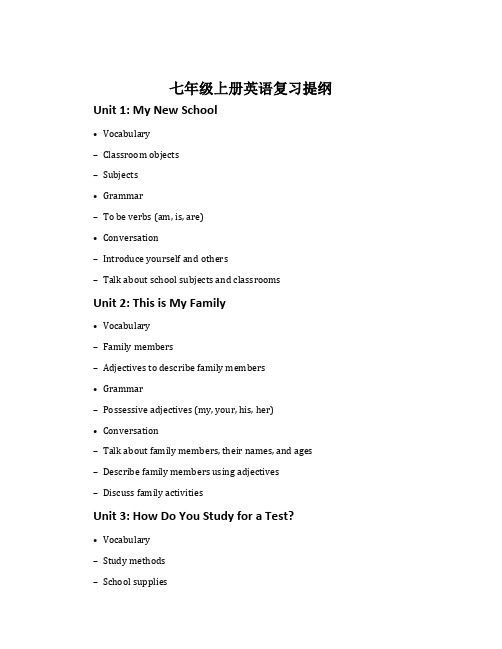
七年级上册英语复习提纲Unit 1: My New School•Vocabulary–Classroom objects–Subjects•Grammar–To be verbs (am, is, are)•Conversation–Introduce yourself and others–Talk about school subjects and classroomsUnit 2: This is My Family•Vocabulary–Family members–Adjectives to describe family members •Grammar–Possessive adjectives (my, your, his, her) •Conversation–Talk about family members, their names, and ages–Describe family members using adjectives–Discuss family activitiesUnit 3: How Do You Study for a Test?•Vocabulary–Study methods–School supplies•Grammar–Present simple tense•Conversation–Talk about study methods and preferences–Discuss different school subjects and their difficulties –Ask and answer questions about study habitsUnit 4: I Love Basketball!•Vocabulary–Sports–Action verbs related to sports•Grammar–Present continuous tense•Conversation–Talk about sports and hobbies–Discuss likes and dislikes–Describe activities using action verbsUnit 5: What Are You Doing?•Vocabulary–Daily routines and activities•Grammar–Present continuous tense for daily routines •Conversation–Talk about daily routines and schedules–Ask and answer questions about activitiesUnit 6: I’m Going to Study Computer Science •Vocabulary–Future plans and occupations•Grammar–Be going to + infinitive•Conversation–Talk about future plans and ambitions–Discuss favorite subjects and career aspirationsUnit 7: How Was Your Weekend?•Vocabulary–Past activities and events•Grammar–Past simple tense•Conversation–Talk about past activities and events–Ask and answer questions about weekendsUnit 8: How Do You Make a Banana Milkshake?•Vocabulary–Food and cooking–Recipe ingredients and steps•Grammar–Imperative verbs•Conversation–Talk about food preferences and cooking experiences–Give instructions on how to make a dishUnit 9: Let’s Go Shopping!•Vocabulary–Clothing–Colors•Grammar–Plural nouns•Conversation–Talk about clothing preferences and shopping experiences–Describe clothing using colors and sizesUnit 10: How’s the Weather?•Vocabulary–Weather conditions–Seasons•Grammar–Present continuous tense for weather•Conversation–Talk about weather conditions and seasons–Discuss favorite seasons and outdoor activitiesRemember to review vocabulary, grammar, and conversations from previous units to reinforce your understanding of the language. Practice speaking and listening by engaging in conversations with your classmates or online language learning resources.Good luck with your studies!。
人教版七年级上册英语复习提纲
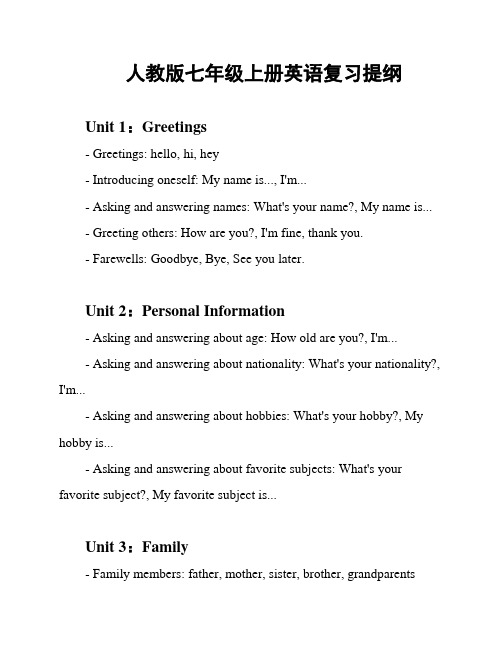
人教版七年级上册英语复习提纲Unit 1:Greetings- Greetings: hello, hi, hey- Introducing oneself: My name is..., I'm...- Asking and answering names: What's your name?, My name is...- Greeting others: How are you?, I'm fine, thank you.- Farewells: Goodbye, Bye, See you later.Unit 2:Personal Information- Asking and answering about age: How old are you?, I'm...- Asking and answering about nationality: What's your nationality?, I'm...- Asking and answering about hobbies: What's your hobby?, My hobby is...- Asking and answering about favorite subjects: What's your favorite subject?, My favorite subject is...Unit 3:Family- Family members: father, mother, sister, brother, grandparents- Describing family members: She is my mother. He is my father.- Talking about family members' occupations: My father is a doctor. My mother is a teacher.- Expressing family relationships: He is my brother. She is my sister.Unit 4:School Life- School subjects: English, math, science, history- Talking about school subjects: I like English. Math is difficult.- Talking about school facilities: Our school has a library and a playground.- Describing activities in school: We have PE class on Mondays and Wednesdays.Unit 5:Numbers- Cardinal numbers: one, two, three, four...- Ordinal numbers: first, second, third, fourth...- Counting objects: How many...?, There are...- Describing quantities: I have three books. She has four pens.Unit 6:Colors- Basic colors: red, blue, yellow, green...- Describing colors: The sky is blue. The sunflower is yellow.- Expressing preferences: I like red. What's your favorite color?Unit 7:Animals- Describing animals: The cat is cute. The dog is friendly.- Talking about pets: I have a pet cat. Her name is Lily.- Talking about animal characteristics: Elephants are big. Birds can fly.Unit 8:Food and Drinks- Food items: bread, rice, noodles, fruits...- Describing food: The pizza is delicious. The noodles are spicy.- Expressing likes and dislikes: I like pizza. I don't like vegetables.- Talking about preferences: What's your favorite food? I like chocolate.以上是《人教版七年级上册英语复习提纲》的简单总结,包括问候、个人信息、家庭、学校生活、数字、颜色、动物以及食物和饮料等内容。
北师大版英语七年级上册复习提纲(详细版)
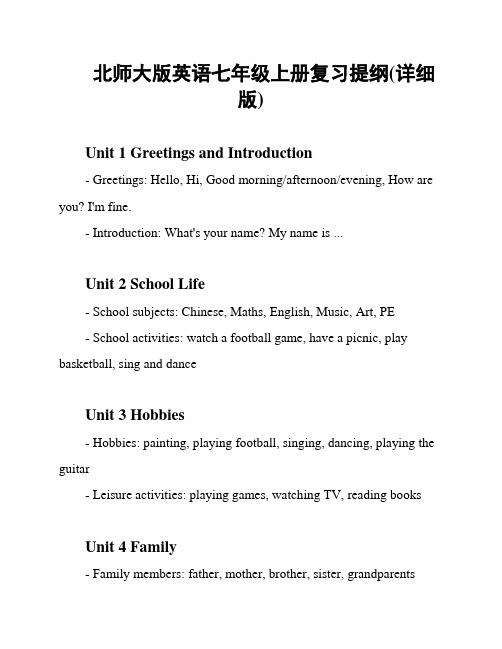
北师大版英语七年级上册复习提纲(详细版)Unit 1 Greetings and Introduction- Greetings: Hello, Hi, Good morning/afternoon/evening, How are you? I'm fine.- Introduction: What's your name? My name is ...Unit 2 School Life- School subjects: Chinese, Maths, English, Music, Art, PE- School activities: watch a football game, have a picnic, play basketball, sing and danceUnit 3 Hobbies- Hobbies: painting, playing football, singing, dancing, playing the guitar- Leisure activities: playing games, watching TV, reading booksUnit 4 Family- Family members: father, mother, brother, sister, grandparents- Describing people: tall, short, long hair, short hair, funny, kindUnit 5 Food and Drinks- Food and drinks: apple, banana, orange, milk, water, tea- Meals: breakfast, lunch, dinner- Table manners: don't speak with food in your mouth, use chopsticks/fork/spoon/knife and forkUnit 6 My Day- Daily routine: get up, wash face, have breakfast, go to school, have lunch, have dinner, go to bed- Telling the time: what's the time? It's ...- Activities: listen to music, play games, do homeworkUnit 7 Travel- Transportation: bike, bus, subway, train, plane- Places to go: park, zoo, museum, beach, mountain- Directions: go straight, turn left/right, cross the streetUnit 8 Shopping- Shops: supermarket, bookstore, clothes shop, toy shop- Items for sale: vegetables, fruit, clothes, toys- Money: yuan, coins, billsUnit 9 Health- Body parts: head, shoulder, stomach, leg, foot- Expressing pain: It hurts. My ... hurts.Unit 10 Festivals- Festivals: Spring Festival, Mid-Autumn Festival, Christmas- Activities: eat dumplings, watch the lunar eclipse, decorate the Christmas tree此文档为北师大版英语七年级上册复习提纲。
人教版七年级上册英语复习提纲(背诵版)

人教版七年级上册英语复习提纲(背诵版) Unit 1 My name's Gina.- Review of introducing oneself and others- Vocabulary: name, spell, first, last, letter- Grammar: Using "to be" in present tense- Dialogue practice: Introducing oneself and othersUnit 2 This is my sister.- Review of family members- Vocabulary: sister, brother, mother, father, parent, baby- Grammar: Using possessive adjectives (my, your, his, her, our, their)- Dialogue practice: Talking about family membersUnit 3 Is this your pencil?- Review of school supplies- Vocabulary: pencil, pen, book, ruler, eraser, pencil case, dictionary- Grammar: Asking and answering questions with "Is this/that your...?"- Dialogue practice: Asking and answering questions about school suppliesUnit 4 Where's my backpack?- Review of prepositions of place- Vocabulary: backpack, desk, chair, floor, wall, door, window- Grammar: Asking and answering questions with "Where's...?" and using prepositions of place (on, in, under, behind, in front of, next to) - Dialogue practice: Asking and answering questions about the location of objectsUnit 5 Do you have a soccer ball?- Review of sports and leisure activities- Vocabulary: soccer ball, basketball, baseball, ping-pong ball, tennis racket, swim, bike- Grammar: Asking and answering questions with "Do you have a...?" and using "Yes, I do"/"No, I don't"- Dialogue practice: Asking and answering questions about sports and leisure activitiesUnit 6 What time is it?- Review of telling time- Vocabulary: hour, minute, o'clock, half past, quarter past/to- Grammar: Asking and answering questions with "What time is it?"- Dialogue practice: Asking and answering questions about timeUnit 7 I go to school by bus.- Review of transportation and places in town- Vocabulary: bus, subway, bike, school, library, park, store, post office- Grammar: Using prepositions of transportation (by, on, in) and asking and answering questions with "How do you go to...?"- Dialogue practice: Asking and answering questions about transportation and places in townUnit 8 My birthday is in December.- Review of months and dates- Vocabulary: January, February, March, April, May, June, July, August, September, October, November, December- Grammar: Using "in" for months and asking and answering questions with "When is your birthday?"- Dialogue practice: Talking about birthdays and datesUnit 9 What does he look like?- Review of physical descriptions- Vocabulary: tall, short, thin, heavy, young, old, hair, eyes- Grammar: Asking and answering questions with "What doeshe/she look like?" and using adjectives to describe physical appearance- Dialogue practice: Asking and answering questions about physical appearanceUnit 10 I'd like some noodles.- Review of food and drink vocabulary- Vocabulary: noodles, rice, dumplings, chicken, beef, fish, vegetable, fruit, water, juice- Grammar: Ordering food and drink with "I'd like..." and using "please" and "thank you"- Dialogue practice: Ordering food and drink in a restaurant or caféConclusion。
七年级英语上期末复习提纲

仁爱英语七年级上期复习提纲Uint 1and Unit 21、come from =be from 来自2、 A look like B = A and B look the same 看起来很像3、In the same class/school/grade 在同一个班级/学校/ 年级4、In different classes/schools/grades在不同的班级/学校/ 年级5、give sb. sth.=give sth. to sb.把某物给某人6、Please give this letter to Maria.= Please give Maria this letter.7、I’ll give it to her.8、对颜色提问:What color+is/are …?回答:It’s/They are +颜色9、want to do sth. 想做某事want sth 想要某物10、(be) in+颜色= (be) in +(a/an )+衣服穿着什么颜色的衣服11、The girl in red is Mary.=The girl in a red coat is Mary.穿红色衣服的这个女孩是玛莉。
12、He is in a blue shirt. =His shirt is blue.13、look+adj.(形容词) 看起来……14、look at sb./sth. 看某人/某物15、next to 在…..近旁,紧挨着16、Who is your/her/ his/their favorite actor?17、He has a wide mouth.=His mouth is wide.他长有一张大嘴。
18、对外貌/长相提问用:What does/ do …look like ?19、He has a big nose.(变否定句)——He doesn’t have a big nose.20、She has long hair.(变一般疑问句)——Does she have long hair?21、We have small eyes. (变否定句)____We don’t have small eyes. (变一般疑问句) Do you have small eyes?22、 a pair of shoes /pants 一双鞋子/一条裤子23、Whose jacket is this ?=Whose is this jacket?24、These are my pants.=These pants are mine.25、my+n.=mine your+n.=yours our+n.=ours…..即:形物代+名词=名物代26、形物代:my, your , his , her, its, our, your , their27、名物代mine, yours, his, hers, its , ours, yours, theirs28、Please help us find him. 请帮助我们找到他。
- 1、下载文档前请自行甄别文档内容的完整性,平台不提供额外的编辑、内容补充、找答案等附加服务。
- 2、"仅部分预览"的文档,不可在线预览部分如存在完整性等问题,可反馈申请退款(可完整预览的文档不适用该条件!)。
- 3、如文档侵犯您的权益,请联系客服反馈,我们会尽快为您处理(人工客服工作时间:9:00-18:30)。
仁爱英语七年级上期复习提纲Uint 1and Unit 21、come from =be from 来自2、 A look like B = A and B look the same 看起来很像3、In the same class/school/grade 在同一个班级/学校/ 年级4、In different classes/schools/grades在不同的班级/学校/ 年级5、give sb. sth.=give sth. to sb.把某物给某人6、Please give this letter to Maria.= Please give Maria this letter.7、I’ll give it to her.8、对颜色提问:What color+is/are …?回答:It’s/They are +颜色9、want to do sth. 想做某事want sth 想要某物10、(be) in+颜色= (be) in +(a/an )+衣服穿着什么颜色的衣服11、The girl in red is Mary.=The girl in a red coat is Mary.穿红色衣服的这个女孩是玛莉。
12、He is in a blue shirt. =His shirt is blue.13、look+adj.(形容词) 看起来……14、look at sb./sth. 看某人/某物15、next to 在…..近旁,紧挨着16、Who is your/her/ his/their favorite actor?17、He has a wide mouth.=His mouth is wide.他长有一张大嘴。
18、对外貌/长相提问用:What does/ do …look like ?19、He has a big nose.(变否定句)——He doesn’t have a big nose.20、She has long hair.(变一般疑问句)——Does she have long hair?21、We have small eyes. (变否定句)____We don’t have small eyes. (变一般疑问句) Do you have small eyes?22、 a pair of shoes /pants 一双鞋子/一条裤子23、Whose jacket is this ?=Whose is this jacket?24、These are my pants.=These pants are mine.25、my+n.=mine your+n.=yours our+n.=ours…..即:形物代+名词=名物代26、形物代:my, your , his , her, its, our, your , their27、名物代mine, yours, his, hers, its , ours, yours, theirs28、Please help us find him. 请帮助我们找到他。
29、help sb. (to) do sth. =help sb.with.sth. 帮助某人做某事Unit 3 Topic11、C ould you please tell me your name?请你告诉我你的名字好吗?2、C ould you please do sth.? 请某人做某事好吗?3、t ell sb. sth =tell sth. to sb 告诉某人某事4、H e/She/I can speak some English .5、s peak+语言说某种语言6、c an/could /will/would (情态动词) + 动词原形7、s ome 一些(用于肯定句和语气委婉或表建议的疑问句中)8、any一些(用于否定句和疑问句中)9、w ell 好(副词adv.)修饰动词即做某事做得好(do sth. well)如:speak English well10、good 好(形容词adj.)be+good ; good+n.(名词)She is good. She is a good student.11.No problem.=Sure.没问题/当然12.no 的用法:1)、对一般疑问句作否定回答;2)、否定名词(即no + 名词)13、not的用法: 否定动词(即把原句变成否定句)如:She ____ _____(not speak )English.She doesn’t speak English.14、like…very much/a lot 非常喜欢……like…a little 喜欢……一点not like …at all 根本不喜欢……15、He knows a lot about China. (a lot 修饰动词)Know about 了解有关……16、live in +sp.(地点) 住在某地live with sb. 和某人住在一起17、visit+sp 参观某地visit Beijing 参观北京18、What does he say in the letter?他在信中说什么?Say 说,讲+ 说的内容19、many(许多的)+ 可数名词复数many studentsa lot of(许多的)+ 可数名词复数/ 不可数名词a lot of students ; a lot of milk20、help each other 互相帮助study each other 互相学习21、人称代词:主格I you he she it we you they宾格me you him her it us you them(主格用于动词之前;宾格用于动词和介词之后。
)22、often /all/both/usually…放于be 动词,情态动词,助动词之后,其它动词.之前.Unit 3 Topic 21、I’m home .我到家了。
She is home.她到家了。
(be)at home 在家2、对职业提问用:What do/does sb. do?=What be sb.?= What be one’s job?如:What do you do ?=What are you? =What is your job?3、回答职业:sb. be+职业(如:She is a nurse/a teacher/a cook/an actor.)4、o n a farm ; in a hospital; in an office ; in a school ; in a restaurant.5、M aria’s father is a farmer. He works on a farm. 玛丽娅的父亲是农民,他在农场上班。
6、M y mother is an office worker. She works in an office.我妈妈是公务员,她在办公室上班。
7、s how sb.sth.=show sth. to sb.把……给某人看Show me your photo. =Showyour photo to me.8、a photo of my/his/her/our family=my/his/her/our family photo9、I have a happy family. 我有一个幸福的家庭。
10、My grand parents live with us. 我和我的祖父母住在一起11、She likes to play with Kitty. 她喜欢和Kitty一起玩。
10 . like to do sth. / like doing sth. 喜欢做某事11、play with sb./sth. 和某人一起玩/玩某物12. on the sofa 在沙发上13.Is the young woman in yellow your aunt?14、Miss Wang teaches us/me/them Chinese. 王老师教我们/我/他们中文.teach sb.(宾格)sth.Unit 3 Topic 31、h elp yourself/yourselves to sth. 随便吃/喝……2、w ould like to do sth.=want to do sth. 想做某事would like sth.= want sth . 想要某物would like sb. to do sth.=want sb. to do sth. 想要某人做某事3、W ould you like sth.?肯定回答:Yes,please. 否定回答:No, thanks.4、W ould you like to do sth.? 肯定回答:Yes,I’d like/love to. 否定回答:I’msorry I can’t./ I’d like that, but…..5、W ould you like to have dinner with me? Yes, I’d like to.6、W hat about =How about? .....怎么样7、W hat/How about sth./sb/doing sth.? 某物/某人/ 做某事怎么样8、a ll right .好吧/行That’s all right. 不用谢,没关系9、W hat would you like to drink/eat? 你想喝点/吃点什么?10、Would you like something to drink/eat? 你想要一些喝的/吃的东西吗?11. Milk for me,please. 请给我牛奶。
Me,too. 我也一样。
12、Good idea! 好主意!a good idea .一个好主意。
have an idea .有个主意/想法13、have …. for breakfast/lunch/ dinner 早餐/午餐/ 晚餐吃…..14、I usually have chicken with vegetables and rice for lunch.我午餐常吃鸡肉加蔬菜和米饭。
15、May I take your order? 你可以点菜了吗?16、a glass of apple juice ; two glasses of water17、Let me see. 让我想想。
let sb. do sth. 让某人做某事18、eat out 外出吃饭19、May/ Can I help you? =What can I do for you?我能帮你吗?/ 你想买点什么/你想吃点什么20、The man in green likes fish and eggs.(变否定句)The man in green doesn’t like fish or eggs.(否定句中的和用or).21、提建议:1)、Why not + 动词原形=Why don’t you +动词原形2)、What/ How about sth/doing sth.?3)、Would you like sth/to do sth.?如:Why not have some fish ?=What about having some fish?=Would you lik e to have some fish? 回答:Good idea.22、be kind to sb.对某人友好They are all kind to me.他们对我都友好。
